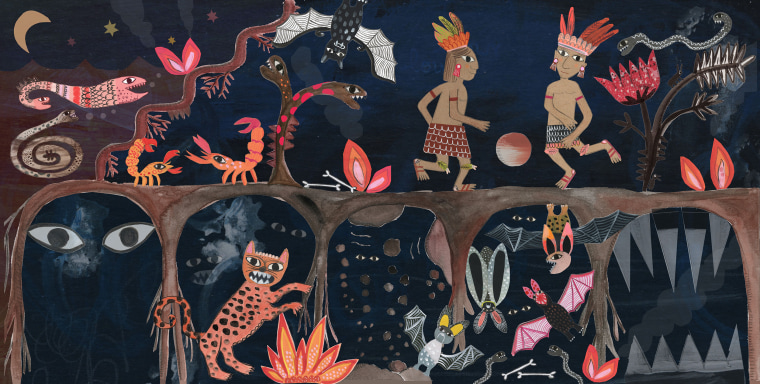“The Popol Vuh in many ways is like ‘Beowulf,’ the Bible,” says author Ilan Stavans, “but the Spanish Empire kept these narratives … from being recognized as legitimate.”
Every culture has an origin story. Many Latinos can trace their cultural roots to an epic poem that was passed down in Central America for over a millennium — but this rich, important history has been largely buried, Mexican scholar Ilan Stavans says.
“The Popol Vuh in many ways is like ‘Beowulf,’ the Bible, the Viking sagas, ‘The Iliad’ and ‘The Odyssey,'” says Stavans, a Latin American and Latino culture professor at Amherst College. “It tells stories of battles and the rise and fall of a people.”
Stavans is the author of “Popol Vuh: A Retelling,” a prose rendition of the heroic epic poem about the creation of the world as told by the K’iche’ Maya people of Guatemala. The book, with stunning illustrations by the Salvadoran folk artist Gabriela Larios, is out Tuesday.
The Popol Vuh is considered one of the most important texts about the Mayans and the ancient history of the Americas. Although scholars acknowledge its significance and other versions of the book have been published, it’s not commonly known.
“None of the indigenous narratives of the Americas have achieved canonical status worldwide. The disdain has to do with the allergy of Europe to nontraditional stories from outside the continent,” Stavans says. “The Spanish Empire kept these narratives — the Popol Vuh is unquestionably the most important of them — from being recognized as legitimate. And Mexico and Central America haven’t invested in them wholeheartedly, keeping them at best as museum artifacts.”

It’s believed that the sprawling epic was passed down orally for over a thousand years until it was first put in writing by K’iche’ nobility around the 1550s, when they found themselves under the control of Spanish colonizers.
It was later translated into Spanish by the Dominican friar Francisco Ximénez at the beginning of the 18th century.
“The preservation of the Popol Vuh is a story about indigenous oppression, survival and endurance. But it also shows how colonizers can have within themselves the ability to rescue a culture, give voice to a people as an outsider,” says Stavans, referring to Ximénez, who was, ironically, largely forgotten by history.



